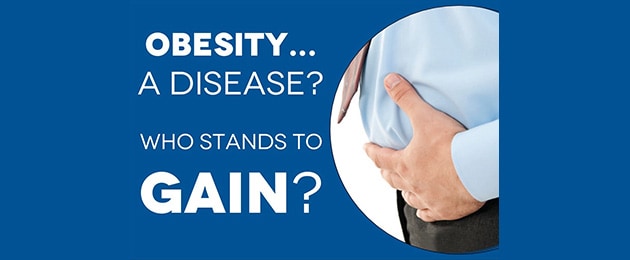In our opinion nothing could have set America back further in its vital fight against overweight/obesity than the decision by the AMA to label obesity a medical disease.Obesity is a condition of excess fat accumulation brought on by a series of preventable and most importantly reversible lifestyle factors. Our fear is, with obesity now square in the AMA’s court, are we opening a floodgate for pharmaceutical and surgical treatment options? Do you think your doctor is going to prescribe proper diet, lifestyle and micronutrient supplementation to treat your weight problem or prescription diet pills and/or surgical procedures? Since there is really no profit in the first three options, not to mention a time factor that is simply not conducive to a 10-minute doctor visit, you can bet it’s going to be the diet pills and the surgery.
The fact is, weight loss pills are not the answer. All one has to do is look to the past to see to this. Weight loss at what cost??? Perhaps a very high cost to the person struggling with their weight. Not so long ago the FDA said Meridia was safe and then a study found that Meridia, also known by its generic name sibutramine, increased the risk of serious heart problems by 16 percent, heightening the likelihood for complications such as heart attacks, strokes, and even death. The study also found that taking Meridia resulted in only a small weight loss. And remember the Fen-Phen fiasco of the 1990s. This earlier anti-obesity medication caused heart valve problems, which is a potentially fatal condition. This recall took three years and numerous people were injured because of this drug.
Then you have the weight loss drug, Alli, which works to block the absorption of fat. Previously known as the prescription medications Xenical and Orlistat, Alli works by blocking the absorption of fat after it has been ingested. The problem with this is that if we block fat, we lose our ability to absorb important essential fatty acids and fat-soluble vitamins (A, D, E, and K). For example, research has shown that Alli can reduce the absorption of the essential micronutrient vitamin E by 60 percent. Why would we want to reduce the amount of something that has the word “essential” in its name? Vitamin K helps to reduce calcification of the arteries, are we trading in weight loss for a heart attack? Vitamin D deficient women are on average 16 pounds heavier than those sufficient. How can hindering the absorption of vitamin D be prescribed for weight loss? Here is another little fact that the makers of Alli don’t share with you: German studies have shown that this “diet aid” may actually raise appetite sensations and increase food consumption.
And what about weight-loss surgeries, are they any better? We believe that the most dangerous type of diet aids, when considering micronutrient sufficiency, may be surgical procedures such as laparoscopic banding (lap band) and gastric bypass surgery. These medical procedures cut out or “band off” a portion of patients’ stomachs so they cannot eat large portions of food. Additionally, these surgeries hinder patient’s ability to fully absorb their essential micronutrients. These missing micronutrients lead to micronutrient deficiency and eventually to all sorts of health conditions and diseases including obesity. Our fear is these surgeries will become much more prevalent with the physicians new power to diagnose obesity as a disease that must be cured medically.
Who is supporting this decision? It may not surprise you to learn who is supporting the AMA’s new decision. According to Dr. William Davis, author of Wheat Belly, the largest contributors to the Obesity Action Committee (OAC), a non-profit obesity advocacy group in favor of the AMAs decision are “Eisai Pharmaceuticals, maker of BELVIQ, the new drug for weight loss; Ethicon EndoSurgery, makers of laparoscopic operating room supplies; Vivus, Inc., another obesity drug maker; the American Society for Bariatric Surgeons; and Orexigen, developer of the combination drug naltrexone-buproprion for weight loss, now in FDA application stage. (Recall that naltrexone is the opiate blocking drug taken by heroin addicts but now being proposed to gain approval for weight loss.)… The OAC Board of Directors is [also] filled with bariatric surgeons, such as Drs. Titus Duncan and Lloyd Stegemann, people who make a living from procedures and surgeries like gastric bypass and lap-band.” It figures, right?
There are those that try to find a bright side and say this decision will allows more people to get nutritional counseling covered, and that may help the obesity problem. But will it, or will it drive up insurance costs and make it easier for insurance companies to deny coverage? The only people that seem to be winning here are the medical doctors and the insurance companies. The doctors can now bill for this service. More people will now be able to be put on prescription diet drugs and have it covered. And more surgeries can be performed under insurance. The insurance companies will also be able to charge more or turn people down due to obesity as a preexisting condition.
And has anyone stopped to think about how obesity will be determined? Will it still be measured by BMI? Many people (those who build muscle and workout regularly) will be labeled incorrectly as overweight and obese. The BMI goes up as the level of muscle rises. This puts people in the obese class who don’t belong there, even elite athletes. We need a better way to classify a person as overweight or obese – how about by measuring body fat levels?
So what is the bottom line? The bottom line is that we cannot medicate ourselves out of obesity or any of the lifestyle diseases for that matter. In our books, Naked Calories and Rich Food, Poor Food, we reveal several contributing factors of obesity, none of which require medical treatment to prevent or reverse. Some of these include:
- The consumption of modern micronutrient depleted foods – many of todays foods have had many of their essential micronutrients stripped from it, leaving only naked calories, causing what we call “hidden hunger”—a physical need to get more of the essential micronutrients we need to live. The only way our bodies know how to do this is to eat more food.
- Micronutrient deficiency – a micronutrient deficient state leads to poor metabolism, sugar and salt cravings, and a host of other obesity inducing side effects.
- Poor Food ingredients- often micronutrient-depleting and addictive, Poor Food ingredients such as wheat, MSG, high fructose corn syrup, and sugar are found in the majority of our modern foods and cause us to overeat.
- The chronic use of over-the-counter and prescription medications, stress, sleep deprivation and many other Everyday Micronutrient Depleting (EMD) lifestyle habits further exacerbates micronutrient depletion. A state of micronutrient sufficiency can improve sleep, reduce stress and make these medications unnecessary.
The true answer to reducing the obesity rate in America is a 3-step approach to achieving micronutrient sufficiency. First, we need to teach individuals to eat a diet full of micronutrientRich Food, rather than chemical laden “food-like substances”. Next, we need to become aware of personal lifestyle habits that may be contributing to further depletion and improve them when possible, and finally, we must recognize the importance of a well-formulated multivitamin to fill in the gap when your diet and daily activities don’t go perfectly to plan. The fact is, we don’t need the AMA for any of these steps, and no prescription drug or stomach shrinking surgery can do it faster, easier or with less risk.











